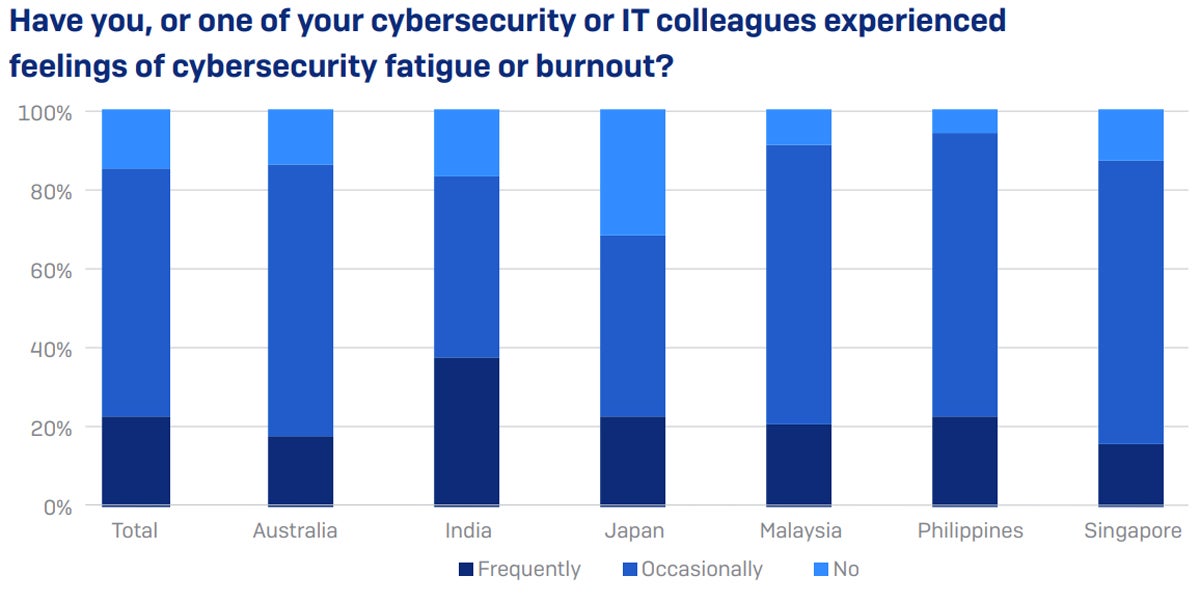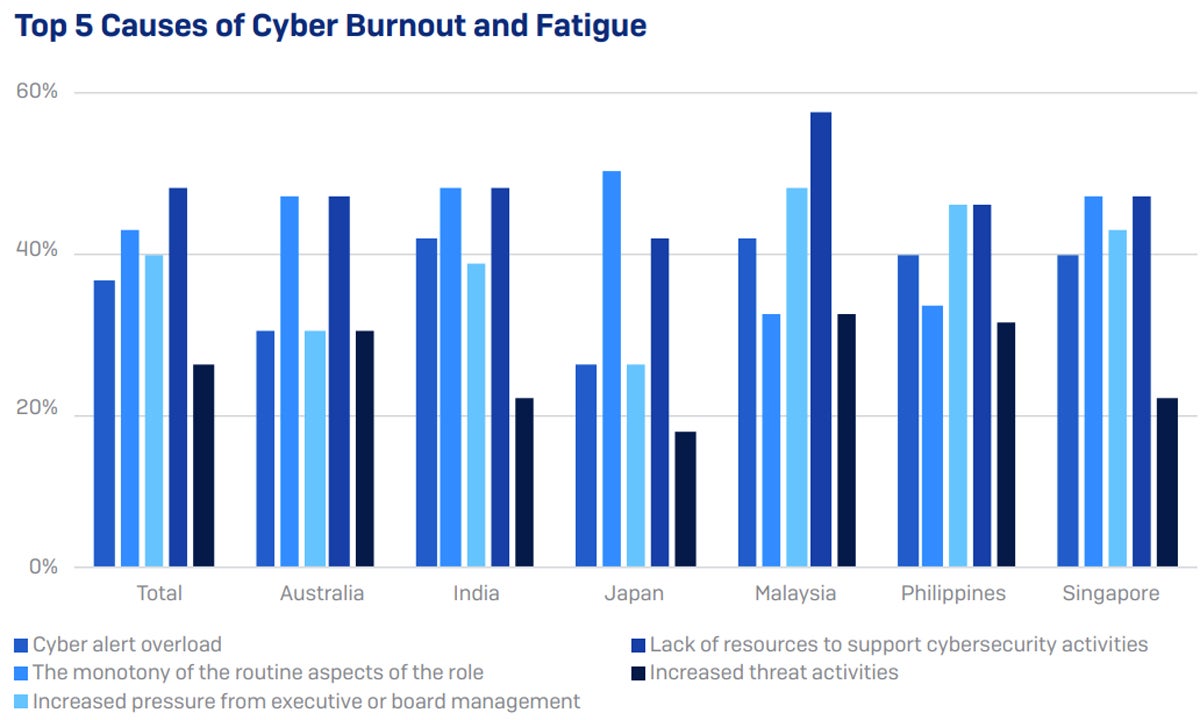Many cybersecurity professionals with burnout in APAC have suffered in silence for years. Nevertheless, a rising physique of regional analysis, together with a latest report from cybersecurity agency Sophos, is bringing consideration to the extent, causes and impacts of the issue.
The Sophos report, The Way forward for Cybersecurity in Asia-Pacific and Japan, discovered burnout and fatigue are widespread, with 9 out of 10 workers impacted on some stage. Causes embrace a scarcity of assets and alert fatigue, usually leading to worker nervousness or disengagement.
Organisations surveyed within the report acknowledge that burnout and fatigue have contributed to decrease workforce productiveness, the success of some cyber assaults and workers selecting to hunt new roles or depart the business totally. AI is known as as one potential help sooner or later.
Burnout amongst cyber professionals a identified drawback for years in APAC
Burnout in cybersecurity is a widely known drawback. Andrew Pade, common supervisor of defence operations on the Commonwealth Financial institution of Australia, has stated that since transferring into cyber safety on the Reserve Financial institution of Australia over 20 years in the past, many friends have left attributable to burnout.
SEE: Ransomware is affecting not simply knowledge however IT professionals psychological and bodily well being.
Analysis in Australia and New Zealand in recent times has supplied proof of this drawback:
- A 2023 examine from Cybermindz and College of Adelaide of 119 cyber professionals in Australia discovered these staff scored larger on the burnout scale than the final inhabitants and, in some instances, exceeded the burnout confronted by frontline well being staff.
- Over half (54%) of Australian cybersecurity professionals admitted in Mimecast’s State of Ransomware Readiness report that cyberattacks have a detrimental influence on their psychological well being, and almost 1 / 4 (22%) had been considering of leaving their present function.
- A Lacework survey launched in 2022 recommended a bigger proportion (57%) of cyber professionals in Australasia had been both in search of new employers or contemplating leaving the business; 87% who needed to depart the business cited burnout from workload as a cause.
The cyber safety burnout drawback was beforehand swept beneath the rug
Jinan Budge, head of Forrester’s safety and threat analysis within the Asia-Pacific, has written that burnout in cybersecurity was mentioned in “hushed and cautious whispers” till 2018, however that the discharge of extra research had elevated the dialog in regional organisations.
Sophos survey exhibits drawback is widespread and rising
The Way forward for Cybersecurity in Asia-Pacific and Japan survey, carried out by Expertise Analysis Asia for Sophos, discovered burnout and fatigue in cybersecurity is widespread within the area. The issue was additionally discovered to be getting worse in 2024, not higher.
- The survey discovered 85% of firms expertise fatigue and burnout amongst cyber and IT professionals; 23% had been experiencing the problem ‘ceaselessly’ and 62% ‘sometimes’ (Determine A).
- 9 out of 10 (90%) of firms acknowledged burnout and fatigue had elevated over the last 12 months, with 30% of firms saying the will increase have risen ‘considerably’.
- The place workers had been surveyed and responded immediately, 90% of all Asia-Pacific cyber and IT workers stated that they had been negatively impacted by burnout and fatigue.

India amongst nations within the APAC area hardest hit by burnout
Burnout and fatigue are most prevalent in India, the place 37% of organisations stated the issue is ‘ceaselessly’ skilled by workers, larger than the 23% regional common. India additionally had the very best (48%) charges of ‘vital’ progress in burnout and fatigue over the past yr.
The primary causes of burnout within the Asia-Pacific cybersecurity occupation
There are 5 prime causes of burnout within the area, in response to the Sophos report (Determine B):
- An absence of assets obtainable to help cybersecurity actions and workers.
- The combo of monotonous routine with difficult moments of exercise.
- Rising stress from boards and govt administration within the area.
- Alert overload from a wide range of cyber expertise instruments and programs.
- A rise in risk exercise creating an ‘all the time on’ atmosphere.

Burnout has penalties for people and organisations
Cybersecurity workers and organisations are each put in danger when burnout happens. The Sophos report famous that, at a time of cyber expertise shortages and an more and more complicated risk atmosphere, worker stability and efficiency had been necessary to safeguard organisations.
Particular person cyber safety efficiency degraded by burnout drawback
People really feel a potent mixture of guilt, apathy, detachment and nervousness attributable to burnout and fatigue. As an example, Sophos discovered 41% of pros with burnout felt they weren’t diligent sufficient of their efficiency, and 34% felt heightened ranges of hysteria if topic to a breach or assault.
PREMIUM: Obtain these ideas for avoiding IT burnout.
As well as, 31% had been feeling cynical, indifferent and apathetic in the direction of cyber actions and duties, whereas 30% acknowledged burnout and fatigue make them need to both resign or change careers. Additional, 10% felt responsible that they may not do extra to help cybersecurity actions.
Employers see diminished productiveness, extra breaches and workers turnover
Particular person efficiency issues result in dangers for employers. Sophos discovered key impacts are:
- A lack of 4.1 hours per week amongst cyber and IT professionals attributable to burnout and fatigue. The Philippines and Singapore skilled the largest drag on productiveness within the area as a result of drawback, logging 4.6 hours and 4.2 hours misplaced per week, respectively.
- Cybersecurity burnout or fatigue was recognized as having contributed to, or been immediately chargeable for, a cybersecurity breach in 17% of organisations. As well as, 17% discovered the issue was chargeable for slower response instances to safety incidents.
- About 23% of cybersecurity turnover was attributed by organisations to burnout and fatigue. An enormous 38% of resignations had been attributed to the issue in Singapore, whereas 28% of Malaysian organisations wanted to ‘transfer on’ workers attributable to stress and burnout.
Employers responding to the cybersecurity burnout drawback
Sophos’ analysis means that, on the entire, employers should not ignoring the rising burnout drawback. Throughout the area, 71% of companies surveyed stated that they had put in place and had been actively offering stress counselling help companies to IT and cybersecurity professionals.
SEE: How the CBA is managing cyber safety in an age of “infinite indicators.”
This doesn’t imply organisational cultures are all the time open to coping with the issue. In Australia, solely 40% of workers who raised the problem with their employer acquired a optimistic response, in contrast with 83% of workers in India and 73% in Malaysia.
Expertise may have a task to play in combating skilled burnout
The Sophos survey report stated that, regardless of alert fatigue, expertise has a powerful future function to play. The report suggests improved automation and the usage of a burgeoning suite of synthetic intelligence cybersecurity options may assist alleviate some points of the causes of burnout.
Sophos concluded that fatigue and burnout are vital points with detrimental impacts on workers and firm capabilities within the Asia-Pacific area.
“Diminished focus and better ranges of vulnerability, together with larger charges of cybersecurity and IT worker churn, are actual issues for a lot of organisations,” the report stated.

